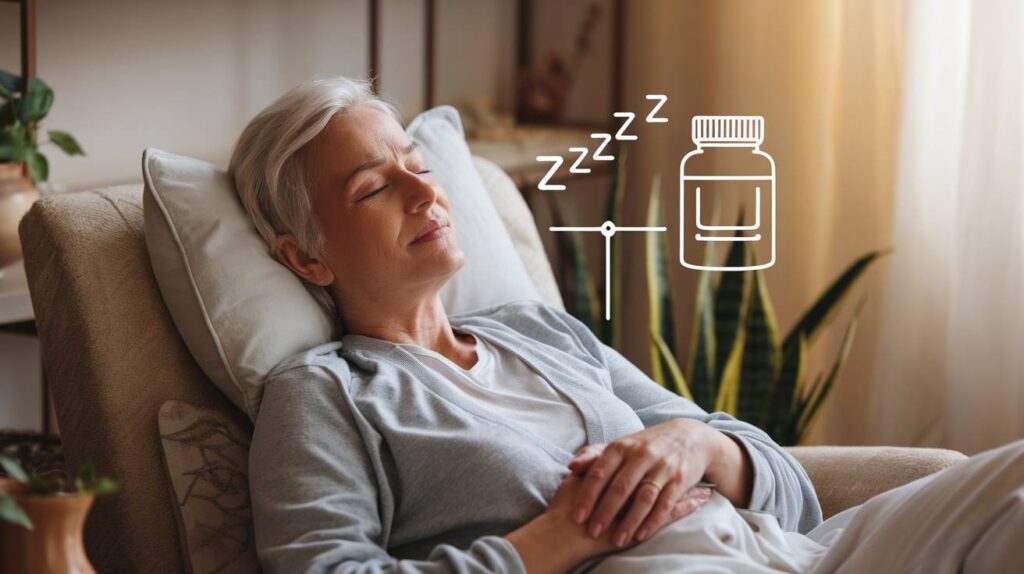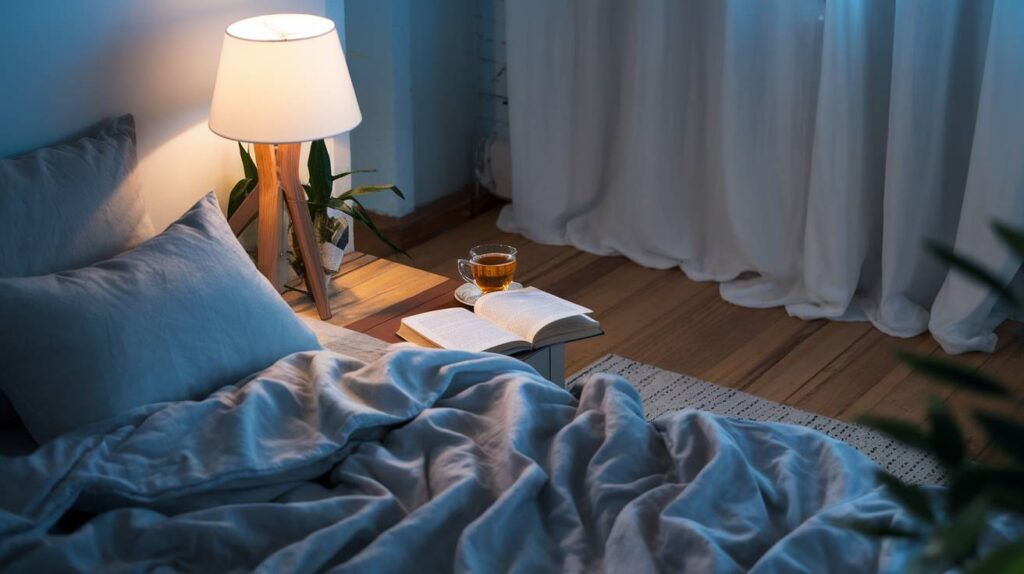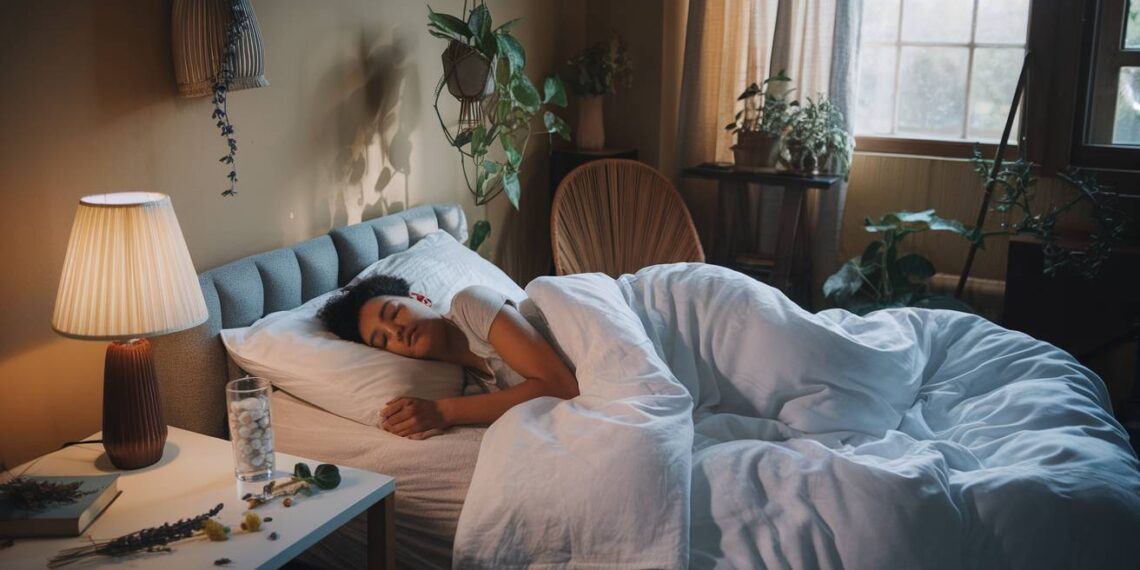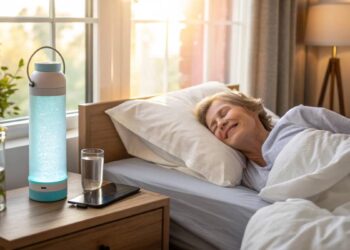Are sleepless nights leaving you feeling exhausted and frustrated? In today’s fast-paced world, quality rest can often seem just out of reach. But what if the key to a peaceful night’s sleep lies in nature’s very own pharmacy?
Welcome to the realm of natural sleep supplements—gentle, effective remedies derived from plants and minerals that have been trusted for generations. These natural aids can help you relax, drift off faster, and enjoy deeper, more restorative sleep without the grogginess or side effects often associated with prescription medications. Let’s delve into how these natural solutions can transform your nightly routine and help you wake up refreshed and energized.
Key Takeaways
- Natural Sleep Aids: Discover how melatonin, valerian root, chamomile, and magnesium can naturally enhance sleep quality.
- Understanding How They Work: Learn how each supplement uniquely promotes relaxation and better sleep.
- Tailored Solutions: Find out which natural supplements target specific sleep issues like insomnia, anxiety, or shift work disruptions.
- Age Considerations: Explore natural remedies suitable for addressing age-related sleep changes in older adults.
- Safety First: Understand the importance of consulting healthcare providers to ensure safe and effective supplement use.
- Healthy Sleep Habits: Implement bedtime routines and create a sleep-friendly environment to amplify the benefits of natural aids.
Understanding Natural Sleep Supplements
What Are Natural Sleep Supplements?
Natural sleep supplements come from plants, minerals, and other pleasantly earthy sources. These handy helpers make it easier to relax, snooze better, and keep that internal body clock ticking just right. They’re perfect for anyone wrestling with sleep woes—be it relentless insomnia, the parent-induced sleep shuffle, night owls on odd shifts, or those stress maniacs who just can’t switch off.

These aids show up in all kinds of ways—capsules, tablets, that lovely calming tea, or even a powder mix. Unlike those heavy-duty prescribeds, these options tend to steer clear of nasty side effects, making them a delightful alternative when you’re thinking outside the pill bottle.
Sleep is the best meditation.” – Dalai Lama
Here’s a quick peek at some popular natural sleep aids:
| Supplement | Where It’s From | What It’s Good For |
|---|---|---|
| Melatonin | Brain’s pineal gland | Setting the sleep clock |
| Valerian Root | Plant origin | Easing anxiety, better snooze |
| Chamomile | Blossom beauty | Helping you unwind and drift off |
| Magnesium | Mineral magic | Chilling muscles, supporting sleep |
How Do Natural Sleep Supplements Work?
These sleep buddies work their magic on how the body winds down at the end of the day. Each supplement has its own bag of tricks, tweaking bits of your sleep cycle or getting those relaxation vibes going. Here’s the lowdown on how some common ones do their thing:
- Melatonin: This trusty hormone gives the green light for bedtime. As night falls, melatonin levels climb, nudging you into sleep-mode, then fade with the morning light. Popping some extra with supplements can help rejig your sleep, ideal for insomniacs or globe-trotters battling jet lag.
- Valerian Root: Known for its mellowing power, this root plays around with brain chemicals, making sleep feel like that comfy old sweater. It tricks the mind into quality sleep and makes sure you hit slumberland fast.
- Chamomile: Famous for wrapping you in calm, chamomile bumps up glycine, which helps relax muscles and lightly hushes the senses like a gentle lullaby.
- Magnesium: This mineral champ doesn’t just relax muscles, it oversees a bunch of body functions that keep snoozing smooth. Think of it as a regulator for neurotransmitters and trusty melatonin.
For those wanting more than just sleep supplements, activities like exercise for insomnia or meditation for sleep might be just the ticket. Digging into what’s behind sleep troubles, like insomnia vs anxiety, can make the path to great sleep even clearer.
Types of Natural Sleep Supplements
Everybody needs their beauty sleep, but sometimes it feels like your brain didn’t get the memo. Enter natural sleep aids, swooping in to offer a little snooze assistance. Here’s a handful of common night-time heroes that might comfort those grappling with insomnia, restless nights, or anxiety-filled dreams.

Melatonin
Think of melatonin as your bedtime director, calling the shots on when to hit the hay. Lots of folks reach for it to fine-tune their sleep clock—especially handy when jet lag has you wide-eyed at 3 a.m. or if you just can’t seem to find the ‘off’ switch at night.
Dosing typically swings between 0.5 and 5 mg, downed about a half-hour to an hour before seeking unicorns in your sleep. Check out the handy table for sleep-related woes and what might work.
| Sleep Concern | Recommended Dosage (mg) |
|---|---|
| General Insomnia | 1 – 3 |
| Jet Lag | 0.5 – 5 |
| Shift Work Adjustment | 2 – 5 |
Curious why falling asleep feels like an Olympic sport for you? Look into our article on why can’t I fall asleep.
Valerian Root
Valerian root sounds like something straight out of a medieval apothecary, doesn’t it? Folks have relied on this herbal remedy for ages to ease insomnia and banish bedtime anxiety. It’s believed to pump up GABA levels in the brain—a chemical that screams “relax!”
You’ll find doses sitting at around 300 to 600 mg, but if bedtime jitters have you tied in knots, higher amounts might just do the trick.
| Sleep Issue | Recommended Dosage (mg) |
|---|---|
| General Insomnia | 300 – 600 |
| Anxiety-Related Sleep Problems | 400 – 800 |
If anxiety’s the gremlin stealing your sleep, our piece on insomnia vs anxiety might be your night-time read.
Chamomile
Now, onto chamomile—a crowd favorite. This herb’s as cozy as a warm blanket, known for its soothing boons. Most folks enjoy it as a tea, with its active ingredient apigenin lulling the mind into calm.
Brewing a couple of cups or tossing back a supplement of 200 to 400 mg before bed usually does the trick.
| Form | Recommended Amount |
|---|---|
| Chamomile Tea | 1 – 2 cups before bedtime |
| Chamomile Supplement | 200 – 400 mg |
For more about munchies that may whisper “sleep” to your brain, check out our guide on foods that help you sleep.
Magnesium
Time to shine some light on magnesium—an essential mineral that plays referee to many body functions, including your nightly ZZZs. It tinkers with the neurotransmitters steering sleep, making it a go-to for insomniacs, particularly those a bit longer in the tooth.
Suggested doses wander between 200 to 400 mg, typically taken when counting sheep gets dull.
| Population | Recommended Dosage (mg) |
|---|---|
| General Adults | 200 – 400 |
| Older Adults | 300 – 500 |
Thinking about how a workout can tuck you in better? Peek at our story on exercise for insomnia.
These natural allies can lend a helping hand to sleep-strugglers of all sorts. Knowing their particular tricks can guide you to the sleep aid best suited to your night-time palling about.
Targeting Specific Sleep Issues
Everybody’s sleep woes have their quirks, and finding the right fix means knowing what you’re up against. Here, we chat about a bunch of sleep problems and the natural snooze boosters that might just do the trick.

Chronic Insomnia
If you’re one of those folks who toss and turn like it’s an Olympic sport, you might have chronic insomnia. Research hints that natural goodies like melatonin, valerian root, and good ol’ magnesium could give you a hand. Plus, throwing cognitive behavioral therapy for insomnia (CBT-I) into the mix could pack an even bigger punch.
| Supplement | How Much to Take | What It Does for You |
|---|---|---|
| Melatonin | 1-5 mg 30 minutes before hitting the sack | Keeps your sleep clock on track |
| Valerian Root | 300-600 mg at bedtime | Helps you drift off faster |
| Magnesium | 200-400 mg every night | Chills out your muscles |
Sleep Disruption in New Parents
If you’re a new parent, you’ve probably got your alarm clock baby sitting right there. Chamomile and magnesium can be lifelines, helping you grab some Zs. Building a relaxing bedtime vibe with sleep hygiene checklists could make those sleepless nights a tad easier.
| Supplement | How Much to Take | What It Does for You |
|---|---|---|
| Chamomile | 200-400 mg or a cozy tea before bed | Helps you unwind |
| Magnesium | 200-300 mg nightly | Relaxes and de-stresses |
Irregular Sleep Patterns in Shift Workers
Shift work can seriously mess with your sleep groove. That’s where natural sleep aids step in. Melatonin is a winner for folks on wonky schedules—it helps reboot your body clock. Pairing it with some exercise for insomnia can also boost your overall snooze time.
| Supplement | How Much to Take | What It Does for You |
|---|---|---|
| Melatonin | 3-10 mg nightly, 30 minutes before bed | Matches your sleep cycle with your life |
| Valerian Root | 300-500 mg at bedtime | Calms those over-caffeinated nerves |
Insomnia Related to Anxiety/Stress
Stress and anxiety are like thieves—stealing your precious shuteye. Chill out with some valerian root and chamomile, known for their soothing vibes. Toss in meditation for sleep and say goodbye to racing thoughts as you tuck in.
| Supplement | How Much to Take | What It Does for You |
|---|---|---|
| Valerian Root | 300-600 mg at bedtime | Tames those anxious jitters |
| Chamomile | 200-400 mg or a warm tea before bed | Sends calming signals to your brain |
Pinpointing the kind of sleep snag you’re facing can make a world of difference in choosing the best natural remedy. And don’t we all want a good night’s sleep? Check out foods that help you sleep and other strategies to break the insomnia cycle if you’re looking for more ways to knock out insomnia.
Addressing Age-Related Sleep Changes
As folks get on in years, they might notice their snoozing habits taking a turn. With those changes sometimes comes a tougher time catching enough restful Z’s. But don’t fret—learning about natural sleep aids suitable for older adults can really help make nights more refreshing.

Sleep Supplements for Older Adults
Elders often find a little extra shut-eye help from natural sleep aids that go easy on the body but do wonders for a night’s rest. Check out these common options that might just be your ticket to dreamland:
| Sleep Helper | What It Does |
|---|---|
| Melatonin | Balances the sleep-wake cycle, helping people fall asleep pronto. |
| Valerian Root | A bit of a chill pill, might speed up the journey to dreamland. |
| Chamomile | Known for its chill-out vibe, perfect for winding down before bed. |
| Magnesium | Relaxes muscles and eases anxiety, making dozing off easier. |
Of course, safety’s key. Chatting with a healthcare pro before jumping into the supplement pool is a smart move.
Considerations for Age-Related Insomnia
Insomnia in older folks can spring from all sorts of things like changes in the way we sleep, health issues, and meds. Here’s what to keep in mind:
- Sleep Style Shifts: With age, sleep gets lighter, and those wake-ups become more common, making deep, sound sleep harder to reach.
- Health Hiccups: Issues like arthritis, nagging pain, and sleep apnea mess with a good night’s rest. Tackling these is a step toward better sleep. For more insights, check out our article on insomnia vs anxiety.
- Medicine Matters: Some pills might mess with your sleep rhythm. It’s worth checking with a doc about how these might mingle with any sleep aids.
| Factor | Sleep Impact |
|---|---|
| Age-related shifts | Less deep sleep, more wake-up calls |
| Health setbacks | Pain and sleep woes can make rest elusive |
| Medications | Some can bring on insomnia or shake up sleep patterns |
Good sleep habits can also play a big role in improving sleep quality. Keeping a regular sleep routine, winding down with a cozy bedtime ritual, and practicing mindfulness or meditation can up the ante on restful nights. For more advice, have a look at our guides on exercise for insomnia and meditation for sleep.
Understanding the perks of natural sleep supplements and the unique hurdles older adults face can help set the stage for better sleep and a happier, healthier life.
Supplement Safety and Considerations
Natural sleep supplements might make nodding off a bit easier, but remember, you gotta play it safe. Getting the facts down and being careful can make all the difference.
Consultation with Healthcare Providers
Before you start popping those pills, chat with a doc. If you’ve got health stuff to consider, or you’re carrying a baby or feeding one, getting the doc’s take is a must. They can tailor advice to fit your health scene and recommend what’s best. With their help, you’ll be choosing with your eyes wide open, ensuring your zzz’s don’t come with unexpected surprises.
| Key Things to Consider | What’s the Deal? |
|---|---|
| Health Issues | Got health quirks? Ask before diving into supplements. |
| Pregnancy/Nursing | During these milestones, safety checks are crucial for both mom and Jr. |
| Other Meds | Docs can spot what doesn’t mix well with your current pill list. |
Potential Interactions with Medications
Popping a natural sleep aid might not always mix well with your other meds. Being upfront with your doc about every script or over-the-counter thing you take helps dodge those unwanted side effects lurking about. Some common mix-ups include:
| Med Type | How It Might Tangle with Sleep Stuff |
|---|---|
| Mood Boosters (Antidepressants) | Could make natural aids act funky. |
| Blood Thinners | Some aids might up bleeding risks when paired. |
| Knock-Outs (Sedatives) | More sleepiness than you bargained for. Could knock you out cold. |
Spilling the beans on meds helps keep everything together and your sleep on track.
Dosage and Timing Considerations
Taking the right amount at the right time determines whether these aids will actually help or just throw off your sleep mojo. Overdoing it? Not cool. Stick to what’s on the bottle, as each kind comes with its own set of rules. Here’s the lowdown on what’s common for your nightstand helpers:
| Sleep Buddy | How Much to Take | Ticking the Clock |
|---|---|---|
| Melatonin | 1-3 mg | 30-60 mins pre-snooze |
| Valerian Root | 300-600 mg | Half an hour before hitting the sack |
| Chamomile | 200-400 mg | 30 mins prior to lights out |
| Magnesium | 200-400 mg | Evening time for better snooze potential |
Nailing the right dose and timing boosts the snooze factor without nasty surprises. And if you’re still troubled by sleep woes, you might want to peep into other options like exercise for insomnia or meditation for sleep. Mixing it up in the sleep strategy department could just be what the doc ordered.
Implementing Healthy Sleep Habits
Folks struggling with sleep may find their nights improve by adopting a couple of simple, yet game-changing habits. We’re talking about setting up a solid bedtime ritual and making your bedroom a cozy sleep haven.

Establishing a Bedtime Routine
Having a regular bedtime routine gives your body the heads-up that it’s time to chill out. Doing mellow activities before hitting the hay can make that shift from daytime hustle to dreamland smooth as butter. Try these:
- Dim the lights: Create that calm, sleepy vibe.
- Read a book: Lose yourself in a story and let the stress melt away.
- Try relaxation tricks: Gentle stretching, deep breathing, or bedtime meditation can ease the tension.
- Cut down on screen time: Give tech a rest about 30-60 minutes before you snooze for a quicker slip into sleep.
Here’s a handy table to help map out a bedtime routine with some effects:
| Activity | What It’s Good For |
|---|---|
| Dim lights | Tells your body it’s tuck-in time |
| Warm bath | Soothes your muscles, dials down the body heat |
| Read a book | Breaks up with daily worries |
| Meditate | Quietens the mind |
| Write in a journal | Clears your head of today’s chaos |
Creating a Sleep-Friendly Environment
Where you sleep makes a big difference in how well you sleep. Tweaking your bedroom setup can make it the perfect spot for catching zzz’s. Here’s how:
- Keep it cool: Aim for 60-67°F (15-19°C) to drift off easier.
- Shush noise: Use white noise machines or stuff some earplugs in to hush random sounds.
- Darkness rules: Make use of blackout curtains to keep pesky light out.
- Comfy is key: Invest in bedding—a good mattress and pillows make all the difference.
Here’s a quick checklist for a restful bedroom:
| Element | What to Do |
|---|---|
| Temperature | Keep it at 60-67°F (15-19°C) |
| Noise | Pop in earplugs or get a white noise machine |
| Light | Get yourself blackout curtains |
| Bedding | Pick a comfy mattress and pillows |
| Clutter | Tidy up and keep it organized |
By getting into a relaxing bedtime groove and setting up a bedroom fit for sleeping, you’ll be on your way to better slumbers. These steps can work wonders with natural sleep aids and other treatments to help tackle insomnia.
Conclusion
Restful sleep isn’t just a dream—it’s a fundamental pillar of good health, influencing everything from your mood to your immune system. Natural sleep supplements offer a harmonious way to reclaim your nights and enhance your well-being. By understanding how these remedies work and selecting those that align with your specific sleep challenges—be it chronic insomnia, the demands of shift work, or age-related changes—you can take proactive steps toward better sleep. Remember to consult with healthcare professionals to ensure these supplements fit safely into your lifestyle, especially if you’re taking other medications. Coupling natural sleep aids with healthy habits, like a calming bedtime routine and a sleep-friendly environment, can further enhance their effectiveness. Embrace nature’s solutions and make quality sleep a consistent and rejuvenating part of your life. After all, waking up refreshed and ready to tackle the day is something everyone deserves.
FAQs
What are natural sleep supplements?
Natural sleep supplements are products derived from natural sources like plants and minerals designed to promote relaxation, improve sleep quality, and regulate sleep cycles without the side effects associated with prescription medications.
How does melatonin help with sleep?
Melatonin is a hormone that regulates your sleep-wake cycle. Taking melatonin supplements can help reset your internal clock, making it easier to fall asleep, especially if you have insomnia or jet lag.
Are natural sleep supplements safe to use with other medications?
Some natural sleep supplements can interact with medications. It’s important to consult a healthcare provider before starting any new supplement to ensure it’s safe based on your personal health and medication regimen.
Which natural sleep aid is best for age-related sleep changes?
Melatonin and magnesium are often recommended for older adults experiencing sleep disturbances due to age-related changes, as they help regulate sleep cycles and promote relaxation.
What healthy sleep habits can enhance the effectiveness of sleep supplements?
Establishing a consistent bedtime routine, creating a sleep-friendly environment (cool, dark, and quiet), limiting screen time before bed, and practicing relaxation techniques can significantly improve sleep quality.
Resources
- National Sleep Foundation – Understanding Natural Sleep Aids
- Mayo Clinic – Melatonin and Sleep: What You Need to Know
- Healthline – 9 Natural Sleep Aids That Are Backed by Science








